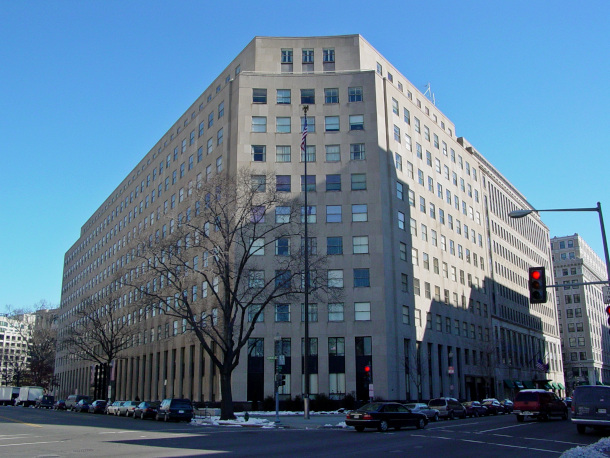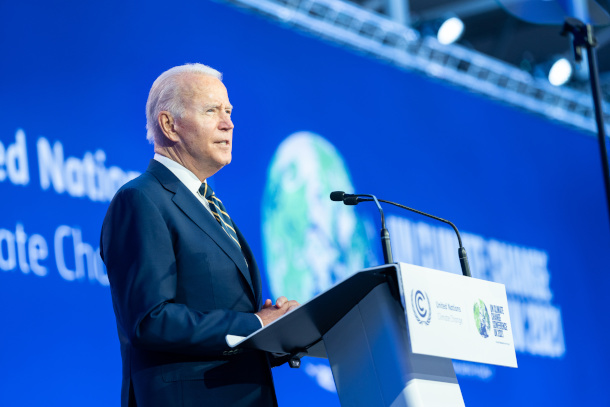U.S. Funding Fossil Fuels Abroad
Air Date: Week of May 3, 2024

The official export credit agency of the United States is the Export-Import Bank of the United States (EXIM) pictured above. (Photo: Ben Shumin, Wikimedia Commons, CC BY-SA 2.0)
Despite an international agreement to phase out financing for fossil fuel projects abroad, the Biden administration recently approved a $500 million dollar loan guarantee for an oil and gas drilling project in Bahrain. Nina Pušić of Oil Change International spoke to Living on Earth’s Paloma Beltran to explain why such actions also hold other nations back from ending this practice
Transcript
CURWOOD: From PRX and the Jennifer and Ted Stanley Studios at the University of Massachusetts Boston, this is Living on Earth. I’m Steve Curwood.
The Biden-Harris administration is coming under fire for failing to keep its promise to stop funding international fossil fuel projects. One of those critics is Nina Pušić, senior climate finance analyst with the advocacy group Oil Change International. She laid out her concerns with Living on Earth’s Paloma Beltran.
BELTRAN: So first let's walk through the basics. What does public financing of fossil fuels entail?
PUŜIĆ: That's a good question. So public financing of fossil fuels is when the government uses taxpayer money through different financial institutions like a public bank or a development finance institution. And then finances fossil fuel projects, fossil fuel being coal, oil or gas. And these public finance institutions in the U.S., there are two, namely, that are relevant to fossil fuel financing. And that's the U.S. Export-Import Bank, which is an export credit agency that supports U.S. companies internationally. And then there's the U.S. Development Finance Corporation that's supposed to help development internationally.
BELTRAN: And how do government subsidies finance fossil fuels?
PUŜIĆ: Yeah. So basically what will happen is, in the case of international public finance, which is the specific type of public finance that U.S. EXIM does, or DFC does, they will get a project, and that project can be from a country, that project can be from, say, for example, ExxonMobil is looking to create a new oil refinery outside of the U.S., like in Indonesia, for example. What ExxonMobil might do is they can go to get a government loan or a loan guarantee through a bank, like the U.S. Export-Import Bank. And they'll go to the bank and submit a project proposal and say, "Hey, we have a great business opportunity here to make a new oil refinery in Indonesia, can you please give us, you know, maybe $100 million in insurance, or $500 million in a loan guarantee.” And there are lots of different types of financial services that they can ask for. But at the end of the day, this type of insurance or guarantee or money that's being given is backed by the U.S. government. So that means that as soon as a project gets funding from the U.S. government, it makes it a lot less likely to fail, because it means that if the project fails, it's actually the U.S. government or the U.S. Export-Import Bank, for example, that onus falls on. So that's why these public finance institutions have such a big impact on the energy industry globally. Because it means that when they choose to support a project, they're signaling to private banks and private financiers that this project is safe to then invest in. So when the U.S. does it for companies like ExxonMobil, it makes other investors be willing to invest in corporations like ExxonMobil. And obviously when it's for fossil fuels, as opposed to renewables, that creates big problems, because then that means that fossil fuel projects become a lot more financially viable than renewable energy projects around the world.

US President Joe Biden. His administration was amongst the 39 governments and public finance institutions that have signed on to the Clean Energy Transition partnership, also known as the Glasgow Statement. In part it promises that by the end of 2022, countries would stop new direct financial support to fossil fuel projects within the year. (Photo: The White House, Wikimedia Commons, Public Domain)
BELTRAN: So, so far, what has the U.S. done or promised in terms of subsidies and loans at the international level?
PUŜIĆ: So at the U.N. Climate Conference in 2021, which was called COP26 in Glasgow, there were 39 governments and public finance institutions that signed on to this initiative called the Clean Energy Transition partnership, also known as the Glasgow Statement. And what they did when they signed on to that initiative is that they promised that within one year, so by the end of 2022, that they would stop new direct financial support to fossil fuel projects within the year. And the U.S. signed on to this promise, it was the Biden administration who signed on, and they made this promise alongside all of these other countries. Unfortunately, while I think there was some intention in the beginning of the Biden administration to actually fulfill this promise and to implement policies at the U.S. Export-Import Bank, and also the Development Finance Corporation, what's happened is that both at DFC and at EXIM they have said that they've decided that this commitment doesn't apply to them. So even though the Biden administration has promised that these, you know, U.S. government agencies would stop funding fossil fuels, U.S. EXIM and DFC have decided that they're going to continue doing that regardless, which presents a lot of big problems, of course, and it wasn't just at the U.N. Climate Conference in 2021 where the Biden administration signed on to this, but it was actually also at the G7 in 2022. So it's not only one but actually two international commitments that this administration made.
BELTRAN: And you mentioned that the United States is amongst multiple countries that have committed to cutting public financing for fossil fuel projects. Tell us more about that.
PUŜIĆ: Yeah, definitely. So there are around 35 other countries that made this promise. And we've seen really good implementation from other countries, say, for example, Canada kept their promise, they implemented a policy a year after signing on to the commitment. The U.K., France, Germany, the Netherlands, Sweden, Australia has just signed on to this commitment, and Norway has just signed on to this commitment too. So we have quite a lot of countries that have made this promise and followed through with it. And unfortunately, the U.S. is one of the only countries that hasn't done it yet. But the problem with the OECD is that it's based on consensus. So you need every single country around the table to agree. And unfortunately until the U.S. agrees that means that there can be no progress.
BELTRAN: How are the upcoming OECD talks related to all of this?
PUŜIĆ: So the OECD is the international governing body of all the export credit agencies of OECD countries. And these export credit agencies are the type of agency that the U.S. EXIM Bank is. So as a part of the OECD, the U.S. subscribes to the rules of the OECD are related to export credit agencies, which means that if the OECD has a new rule about what export credit agencies can and cannot do, that means that that would apply to U.S. EXIM as well. And actually, in 2021, when the Biden administration signed on to this commitment, the commitment has two parts. So the first part is that you need to stop funding fossil fuels domestically through your export credit agencies and your development finance institutions. And then the second step is that you need to align yourselves with other like-minded countries that have signed on to this commitment at the OECD, and then make it an OECD rule that applies to all OECD countries. So unfortunately, the U.S. not implementing domestically doesn't only affect the U.S., but it also affects the entire world. Because until the U.S. agrees and puts forward this initiative at the OECD, it means that the rest of the world isn't going to have any binding laws around it. Which is frustrating because we know, given the extent of the climate crisis, that it's really important that countries align their financial flows with climate goals as urgently as possible.

The Bahrain World Trade Center. The U.S. export credit agency approved a $500 million loan guarantee for an oil and gas drilling project in Bahrain, failing to meet their 2021 promise to stop funding fossil fuel projects. (Photo: B. Alotalay, Wikimedia Commons, CC BY-SA 4.0)
BELTRAN: And from what I understand, fossil fuel projects are the largest recipients of these credit agency subsidies and loans. What's an example of a fossil fuel project funded by these kinds of loans?
PUŜIĆ: Yeah, the most recent one that the U.S. Export-Import Bank has approved is in Bahrain, which is a wealthy oil- and gas-producing country in the Middle East and the Gulf specifically. And in this case, the U.S. gave a $500 million loan guarantee to new extraction of Bahraini oil and gas wells. So because the U.S. gave these $500 million, which is actually one of the largest projects that we've seen so far in terms of what EXIM has given, in terms of its fossil finance since Biden made this commitment, you now have around 400 new oil and gas wells that are going to be put up because of this loan.
BELTRAN: What about renewable energy projects? What are some of the challenges renewable energy companies are facing when it comes to financing? And how is that being discussed amongst OECD countries?
PUŜIĆ: So kind of one of the key issues around renewable energy financing does actually come down to subsidies and public finance, because what happens is that a lot of these institutions are just so used to subsidizing companies like ExxonMobil, for example, that they haven't really done the outreach to show renewable energy companies how they can apply. Also, a big issue is that because oil and gas tends to be more consolidated in certain regions of the world, say, for example, in the Gulf in the Middle East there's lots of oil and gas, in the Gulf of the U.S. there's lots of oil and gas, but it's not evenly distributed throughout the world, it means that you have a lot of finance going to these very specific places for oil and gas. But for renewables, since you can harness renewable energy anywhere, you basically have to spread that financing equally across the whole world for the energy transition. And unfortunately, there are still a lot of barriers to getting there. But one of the barriers is because, say, for example, banks, like the U.S. Export Import Bank, haven't really done a great job of marketing themselves to renewable energy companies, or they will reject renewable energy projects, because they say that they're not big enough or that they don't have, you know, the right kind of project structure or things like that. It's also almost funny, because sometimes the feedback that we get about why certain banks aren't subsidizing renewables is because renewable projects are actually too cheap, or they're too small. And it's funny, because you would think, "Oh, no, renewable energy is too expensive." But actually, because renewable energy is so decentralized, the projects tend to be a lot smaller, which means the loans that they need are less. So you wouldn't need a $500 million loan necessarily, you might need a $50 million loan. But then a bank like EXIM will say sorry, we don't do $50 million loans. So we can only accept $500 million loans. So therefore, we're only accepting loans from companies like ExxonMobil that do giant, enormous projects, which is yeah, a big challenge because of course, as long as we keep giving these large sums of money away to the fossil fuel industry, it means that we're not getting the financing where it needs to go to renewable energy.
BELTRAN: Walk us through the relationship between EXIM, the U.S. export agency which funds credit energy loans, and Congress.
PUŜIĆ: So EXIM is reauthorized by Congress. So every few years—the next reauthorization, for example is in 2026—Congress says whether or not EXIM can exist. So last time EXIM was getting reauthorized, some Republicans in Congress were really upset that EXIM had implemented anything that was stripped of its coal power financing. And because the OECD agreed to a coal-fired-power ban, it meant that EXIM also had to ban its support for coal-fired power. And unfortunately, some Republicans in Congress really didn't like this, so they got very upset and they almost didn't reauthorize EXIM. So EXIM almost didn't exist anymore, which is why the bank is so paranoid about implementing anything that restricts fossil fuel finance, because they're worried that then in 2026, if Congress is controlled by Republicans, that they basically won't get reauthorized and won't be able to exist anymore.

Nina Pusic is the Export Credit Agency (ECA) Climate Action Strategist at Oil Change International. (Photo: Courtesy of Nina Pusic)
BELTRAN: You know, the Biden administration has only a few months left in office. How much pressure is the administration under to follow through the commitments made at COP26?
PUŜIĆ: Unfortunately, I don't think that the administration feels the pressure quite yet. Because they have really gone very slowly in trying to implement this and trying to put pressure on EXIM. And they also still haven't come up with an OECD position, which is really scary because, as I mentioned a bit earlier, if the administration doesn't get reelected, it's very unlikely that a Republican president would ever agree to something like this at the OECD. Which means that then the whole OECD progress is stalled for the next four years. So the Biden administration has two more chances, one coming up in June and then one in November, and those are the two next OECD negotiations before the election, and it's really important that the U.S. puts forward a position or at least agree as to what other countries have come up with in those two periods. But the clock is definitely ticking.
CURWOOD: Nina Pušić, senior climate finance analyst with the advocacy group Oil Change International, speaking with Living on Earth’s Paloma Beltran. We reached out to the U.S. Export-Import Bank but did not get a direct response about the plans for the OECD talks this June. In a press release about the $500 million dollar Bahrain deal, EXIM President and Chair Reta Jo Lewis said: "This transaction will support thousands of U.S. jobs and play a crucial role in ensuring Bapco Energies is able to achieve its climate goals of enhanced grid interconnectivity, more efficiency, decarbonization, and investments in large-scale solar projects.”
Links
Politico | ”‘Rogue’ Agency Backs Overseas Oil and Gas”
Financial Times | “US And EU Differ Over the Future of Fossil Fuel Subsidies in OECD Talks”
Living on Earth wants to hear from you!
Living on Earth
62 Calef Highway, Suite 212
Lee, NH 03861
Telephone: 617-287-4121
E-mail: comments@loe.org
Newsletter [Click here]
Donate to Living on Earth!
Living on Earth is an independent media program and relies entirely on contributions from listeners and institutions supporting public service. Please donate now to preserve an independent environmental voice.
NewsletterLiving on Earth offers a weekly delivery of the show's rundown to your mailbox. Sign up for our newsletter today!
 Sailors For The Sea: Be the change you want to sea.
Sailors For The Sea: Be the change you want to sea.
 The Grantham Foundation for the Protection of the Environment: Committed to protecting and improving the health of the global environment.
The Grantham Foundation for the Protection of the Environment: Committed to protecting and improving the health of the global environment.
 Contribute to Living on Earth and receive, as our gift to you, an archival print of one of Mark Seth Lender's extraordinary wildlife photographs. Follow the link to see Mark's current collection of photographs.
Contribute to Living on Earth and receive, as our gift to you, an archival print of one of Mark Seth Lender's extraordinary wildlife photographs. Follow the link to see Mark's current collection of photographs.
 Buy a signed copy of Mark Seth Lender's book Smeagull the Seagull & support Living on Earth
Buy a signed copy of Mark Seth Lender's book Smeagull the Seagull & support Living on Earth

